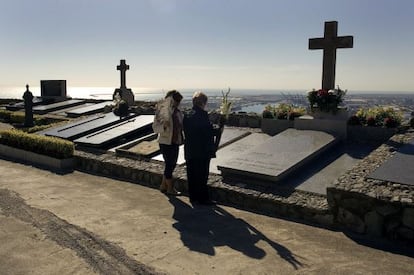Seeking a work-death balance
The right of workers to time away from the office to attend funerals is under the spotlight

The spokesman for labor relations at the CEOE, which is Spain's largest employers group, sparked a storm of criticism recently. José de la Cavada publicly criticized the four days leave that employees are entitled to by law to attend the funeral of a close relative, wisecracking that "the days of the stagecoach have gone." A negative reaction soon followed, prompting the CEOE itself to seek some distance from his comments.
De la Cavada was speaking at a press conference in June to launch a new survey on absenteeism in Spain. Article 37.3 of Spain's Workers' Statute stipulates that employees are entitled to two days off work "for the birth of a child, and for the death, injury, or serious illness, hospitalization or surgery without hospitalization that requires rest at home of relatives to the second degree of blood or family relationship."
Should an employee need to travel in the event of the above factors, he or she is entitled by law to four days off work. Why De la Cavada decided to use the example of attending a funeral is unclear, and his weary joke about stagecoaches certainly fell flat.Juan Rosell, the head of the CEOE, immediately rectified, commenting: "The CEOE and its president do not support what this director has said." The labor unions also joined the chorus of criticism, with the CCOO Workers' Commission dubbing De la Cavada's comments "inadmissible;" the UGT went further, suggesting that Spain's business culture needed to catch up with the times. The Socialist Party's (PSOE) Óscar López said: "We've had enough of workers being squeezed and choked." Finally, De la Cavada was obliged to beg "many pardons," but fell short of actually rectifying his position.
De la Cavada dismissed the furor over his comments, accusing his critics of being "overly sensitive" while pointing out that he was concerned with highlighting the cost of absenteeism. Until now, neither the labor unions nor the employers' confederation had considered that four days' leave for the death of a family member would likely cause any problems to a company. "There is no problem with this, it's a right recognized by law. Furthermore, these agreements bring other benefits in the form of life-work balance," says Manel Hernández, a partner at law firm Sagardoy. Hernández says many collective agreements stipulate that for an employee to justify extra time off work, an "overnight stay" should be involved.
We've had enough of workers being squeezed and choked"
José Antonio González, a Barcelona-based lawyer who works for Col·lectiu Ronda, points out that the law is "minimal" and agrees that collective bargaining agreements tend to improve on the conditions outlined in Spain's labor legislation. "I'm surprised; this has never been a problem and the CEOE has never raised the issue," he says. De la Cavada says that Spain's current legislation on time off work for the death of a close relative simply continued the practice under the Franco regime, which he describes as "very protective." That said, other countries, whose legislation on this matter is based on laws dating back to the 1960s, have brought the issue up recently. In most other European countries, though, employees are given less time off to attend a funeral or visit a seriously ill relative in hospital than in Spain, or the additional time off is not remunerated.
Belgium, a much smaller country than Spain, is currently looking at allowing employees more time off to attend funerals. The country's former employment minister, Jöelle Milquet, raised the issue of extending leave in 2008 and 2010 from three days to 10. In 2011, the Green Party put forward the proposal in parliament."Two to four days is not sufficient," says federal deputy Wouter De Vriendt, adding that Belgium's labor laws date back to the 1960s and need overhauling. "The grieving process is complex and is often accompanied by feelings of fear, guilt, confusion, and anger. People need time to be able to rebuild their lives and to get back to work," he says. His party has proposed extending the amount of time an employee can take off after the death of a family member or partner to 10 days, either consecutively or separately. To reduce the financial costs to the employer, he recommends that the first three days be paid, with the Social Security system covering the rest.
De Vriendt says that initially deputies supported the proposal, but that recent austerity policies have caused them to rethink the idea. "In reality, the additional cost would be minimal, because the majority of parents simply get a sick note from their doctor when the three days established by law are up."
Dutch member of the European Parliament Frieda Brepoels and her Belgian colleague Dirk Sterckx raised the issue in Brussels in 2011 via a parliamentary question in which they suggested that EU legislation set a minimum number of vacation and maternity leave days per year. "But EU law still does not include any specific reference to mourning leave," say the two deputies, pointing out that there are "huge discrepancies on this issue between different member states." The European Commission responded by saying that the EU Work Time Directive's objective is to "reduce the risks to health and safety that workers can be exposed to." The Commission added that "it does not appear that mourning leave can be justified" within these objectives, adding: "The wide range of practices in different member states in this regard should also be borne in mind; these reflect different cultures, religions, and social traditions.
Belgium is looking at allowing employees more time off after the death of a loved one
The Commission does not foresee the presentation of any proposal to introduce mourning leave within the EU." But if parents are entitled to leave in order to welcome their child into the world, why shouldn't he or she be allowed to bid his progenitors farewell? Isn't this something that could have a serious impact on the health of an employee?
"We are talking about close family members. We have a grief counseling service, and we estimate from our experience that most people who have lost somebody close need between a week and 10 days to assure a minimum level of recovery. After that, we begin a period of observation," says Ricard Cayuela, the deputy dean of the Catalan Official College of Psychologists, and an expert in the psychology of the workplace. Knowing when to return to work is also a matter that depends very much on the individual. Cayuela says that some people need to feel useful, and this helps them get over the death of a loved one.Other people need much more time before they can face the return to work. "The important thing is that people are able to decide for themselves," says Cayuela. "In the final analysis, the question really comes down to being able to balance important life events with work," says Manel Hernández.
On the other side of the Atlantic, permission for time off in the event of the death of a loved one depends on which state you live in. It was the subject of fierce debate in California, but during his time as governor, Arnold Schwarzenegger twice vetoed proposals to introduce legislation that would allow employees who had lost a loved one to take four unpaid days off work. Schwarzenegger justified the veto by saying that the state already had a "confusing mess" of laws, and didn't need any further ones. Absenteeism has been falling in Spain since the crisis kicked in, but remains a hot potato for the CEOE. There is little agreement on the figures it represents, with the labor unions accusing the employers' confederation of inflating their figures by including training time and time off for family-related matters.
That said, De la Cavada's comments are the first time the CEOE has mentioned the issue of time off work for mourning. In his presentation on absenteeism, which had been prepared by temporary work agency Adecco, De la Cavada said that collective wage and conditions agreements broadened the content of leave, but without adding any demands to those already outlined under Spanish labor law. The report draws the conclusion that "this could lead to justified absenteeism through paid leave."
Absenteeism in Spain has been falling since the economic crisis began
There is no government survey on absenteeism in Spain, but those prepared by the CEOE and other organizations all agree that the practice has been on the decline in recent years. One interpretation of this tendency is that employees are worried about losing their job at a time of economic crisis and soaring unemployment. Spain's Labor Ministry puts together an annual Labor Market Survey, which includes figures on the amount of hours lost per person each year. Provisional data for 2012 suggest that there has been a slight increase in absenteeism, but that this has been the result of what it calls "occasional causes," and that would include absences from the workplace due to the death of a close relative or partner. These "occasional causes" have also declined. So if the number of hours not worked due to paid leave have not increased over the last decade - above all due to measures allowing employees to seek a better work-life balance that are increasingly being included in work contracts - over the course of the last year the number of hours that the average employee has been absent from their workplace fell from 6.2 to 6.1.
The number of unjustified hours employees are absent from work has remained steady, below the annual average. "The International Labor Organization defines absenteeism as the time that an employee is expected to be productive, and that for whatever reason, is not. But of course these calculations are based on different notions of what one defines as being productive as," says Ángels Valls, who teaches at the Esade business school. Valls believes that the debate sparked by De la Cavada's comments on how much time an employee is entitled to take off work following the death of a close family member is "unjustified."
Seen in the wider context, the impact that such absences could have on the overall Spanish economy are, to say the least, minimal. Valls says that businesses need to establish guidelines regarding time off work so as to be able to function effectively, but also accept that there are unexpected events in our lives and that these sometimes take precedence over work. "In human resources terms, occasions when an employee has an accident, or something comes up, are an opportunity to create a greater degree of complicity between employer and employee," she says. The outcome is likely to be that the employee will feel greater loyalty to the company and be more motivated in their work, she adds.
So why did De la Cavada decide to pick such a sensitive subject in order to make a point about absenteeism? José Antonio González of Col·lectiu Ronda accuses the CEOE of "pushing the envelope" and "pure greed."A member of the CEOE's board, speaking anonymously, offers a different interpretation, suggesting a power struggle within an organization that is in the process of trying to implement major changes with the aim of bringing it into closer contact with the everyday reality that most companies experience. And those companies are less concerned with nitpicking over the number of days an employee can take off to attend a funeral, or whether the unemployment figures can be trusted, and more worried about access to loans, high taxes, and implementing policies to help Spain out of the ongoing crisis.








































